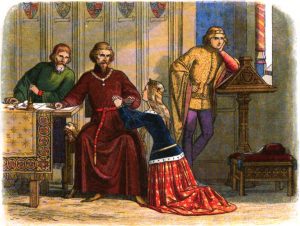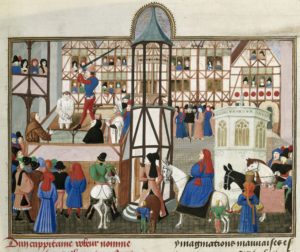
Sir Simon Burley is one of those unfortunate historical personages who is better remembered for his death than for his life. He is a bit if an enigma to us, if only because he was able to inspire extremes of love, friendship and hate all at the same time. Although he was of humble origin, through his exceptional abilities and loyalty to the royal family, he rose to be Lord Warden of the Cinque Ports, Constable of Dover Castle, and Knight of the Garter. He was also tutor and vice-chamberlain (acting chamberlain) to Richard II, and in this role he inspired so much envy and resentment that he paid for the privilege with his life.
Born around 1336, Simon and his older brother John were brought up in court alongside young Edward (the Black Prince); Simon served Edward throughout the Prince’s life. When Edward returned to England a sick man, Burley became chamberlain of his household and served as tutor to young Richard. In 1377, ten year-old Richard became king; Burley carried the king’s sword at the coronation procession, and after the ceremony he carried the exhausted child on his shoulders—where Richard infamously lost one of his ceremonial slippers. Burley transferred his service to Richard’s chamber and was given the posts of Master of the Falcon and Keeper of the Mews. Then he was appointed constable of Windsor Castle for life and given a residence on Thames Street and grants of land in Gloucester and Kent. In 1384, he was appointed constable of Dover Castle the wardenship of the Cinque Ports. Not bad for an up-and-coming knight!
We first hear grumbling against him during the Peasants’ Revolt. In Rochester, a villein was seized while living in town and imprisoned in the castle. (This was a common imposition on an escaped laborer from the lord’s manor; if he could survive in town for one year without capture, he became a free man.) In this case, the villein was a popular man, and provided the excuse for the peasants to overwhelm the castle and spring him from jail. Simon was blamed for imprisoning the man, even though at the moment he was on the continent; it must have been his servants who created such a ruckus.
And what was Burley doing on the Continent? Nothing less than negotiating the marriage between King Richard and Anne of Bohemia. He missed the Peasants’ Revolt altogether, returning with the bride-to-be in December. By now, just turning 15, Richard wanted to reward his closest adherents but had no resources to distribute. Consulting his lawyers, the King managed to pull some strings and get his hands on the Leybourne inheritance—a considerable endowment willed by Edward III to his favorite religious houses. Through some clever shenanigans, Richard was able to grant Burley several manors, from which he immediately ejected the resident canons and took possession. (Burley wasn’t the only recipient of Edward III’s illegally appropriated endowments.) He was to hang onto his ill-gotten gains until his death in 1388.
As vice-chamberlain, Burley had great influence over Richard. He was accused by some of being the power behind the throne. He controlled access to the King, most certainly advised him; his was a position that easily inspired antagonism. By 1386 there had grown two clear political factions: the court party and what was to become known as the Appellant party, controlled by Richard’s uncle the Duke of Gloucester, the powerful Earl of Arundel, and the Earl of Warwick. Henry Bolingbroke (future Henry IV) and Thomas Mowbray joined the Appellants later.
Although Simon was of the court party, he wasn’t immediately challenged. The Lords Appellant had bigger fish to fry. Gathering an army, they confronted the King and appealed (accused) five men of treason. Richard sent his favorite, Robert de Vere to collect a force from Chester and the two armies met at Radcot Bridge. Alas, de Vere was not a soldier and his army was easily overcome, leaving the King isolated and alone. Victorious, the Appellants confronted the King and appealed a second batch of men, Burley among them; they wanted to make sure their palace coup was complete. Richard refused and they threatened his crown—actually, it appears they informally deposed him for three days but couldn’t agree on a successor! Beaten, Richard acquiesced to their demands.

The Merciless Parliament of 1388 was a nasty affair, and by the time it was over all of Richard’s adherents, from earls to knights, were either killed or outlawed. Burley’s trial was prominent because of the incredible resistance that was raised. He was well respected by many of the magnates who vociferously objected to his treatment. Even the Duke of York created a public row in front of Parliament with his brother Gloucester, threatening him to a duel; their argument was broken up by the King. Bolingbroke and Mowbray publicly objected to Simon’s sentence. Richard refused to sign the warrant and the wrangling went on for weeks. In a back room, the King and Queen begged for mercy; she even went down on her knees to Gloucester and reportedly stayed there for three hours. It was all to no avail. The Appellants were unrelenting.
The only thing that broke the deadlock was the people of Kent. According to reports, the populace of his own estates marched on London demanding his execution, threatening to start another riot too reminiscent of the Peasants’ Revolt to be ignored. The opposition caved in and Richard reluctantly signed Burley’s death sentence; he insisted that Burley be beheaded instead of the full traitors’ punishment and the Appellants benevolently agreed. What did they care? They got what they wanted. But the King never forgave the Appellants for their brutal and humiliating treatment of him and his friends; in the end, retribution would be his.
Babette Fulsworth says:
It is sad what happened to Sir Simon Burley. He loved Richard the Second and I am glad that Richard the Second took revenge, even though he got rid of his own uncle, Gloucester. What those five men did to Sir Simon Burley and the others was monstrous.